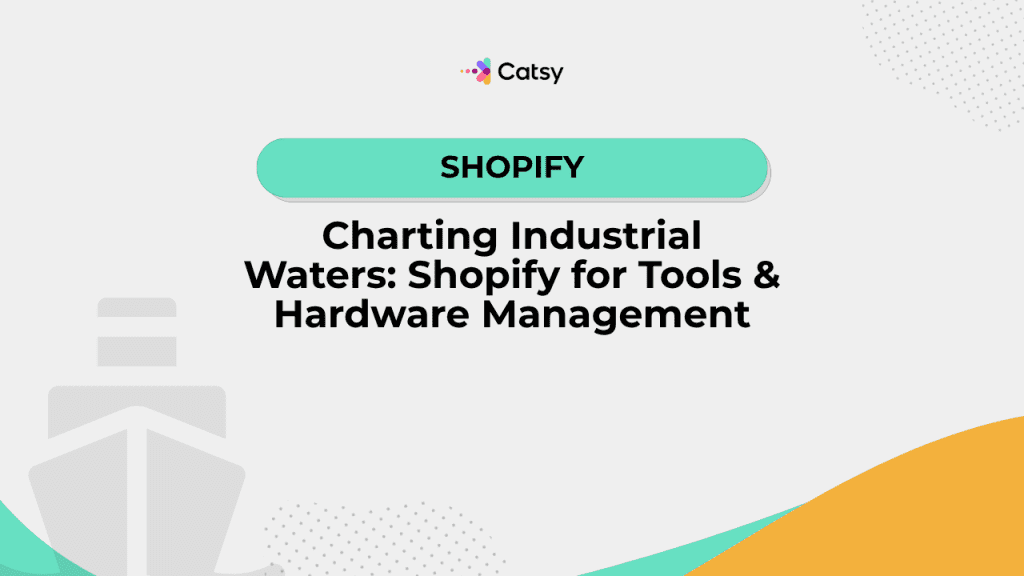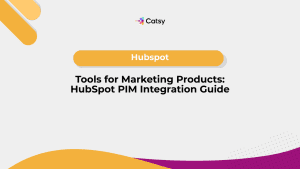Charting Industrial Waters: Shopify for Tools & Hardware Management
Industrial tool and hardware retailers face different challenges in product complexity management than those in other industries. You require detailed tech specs, safety documentation, regulatory compliance information, and even sophisticated pricing structures.

Table of Contents
What You Will Learn
- How to take a strategic approach to industrial tool production specification management using Shopify
- How to implement safety data and compliance frameworks that reduce liability and improve customer confidence
- Bulk pricing implementation strategies for professional and institutional customers
- Technology solutions that bridge the gap between consumer e-commerce platforms and industrial requirements
In this Article
Industrial Tools E-commerce: Navigating Complex Strategic Waters
What Makes Industrial Tools Different?
Industrial tools and hardware involve precision. Tech specs, safety certifications, and application-specific guidance are just a few examples of this. And each product within those categories requires extensive documentation; performance data, installation guides, and maintenance requirements are some specific cases.
Of course, the challenge intensifies when you consider that industrial customers range from contractors to institutions. Each buyer has a unique information need, different purchasing processes, and varied budgets!
Traditional, retail-focused platforms often struggle to navigate these requirements. Businesses are forced to choose between simplified presentations or complex workarounds – these compromise your efficiency and your customer experience.
Why Specialized Product Management Has Become Critical for Charting Industrial Success
The evolution of industrial purchasing has changed how retailers must present those products online. Today’s buyer expects immediate access to detailed specs, pricing information, and safety documentation – these drive their purchase decisions.
When you use sophisticated product management systems for industrial tools, you allow your consumer to make an informed purchase. Meanwhile, you’re reducing the burden on your technical sales teams. Having the right information reduces pre-sale inquiries, minimizes returns, and builds consumer confidence in your brand.
Integrating this detailed content with modern e-commerce platforms is critical to your success. Companies that provide immediate information (alongside streamlined purchasing processes) gain a significant advantage over those relying on catalog-and-quote approaches.
Make Catsy DAM and PIM Software an Extension of Your Team
Book a Free DemoProduct Specification Management: Setting Technical Coordinates
Multi-Dimensional Technical Data:
Industrial tools require extensive specification management. This includes performance ratings, material composition, dimensions, operating parameters, and compatibility specs. These specifications often interconnect in complex ways – changing one parameter affects multiple others. That’s why you need sophisticated data management approaches.
Application-Specific Guidance:
Many of the industrial tools you sell serve multiple applications with different usage requirements or performance characteristics. Your product information system must present this data clearly; your customers must understand which specs matter most for their unique needs.
Standards and Certifications Integration:
OSHA, ANSI, ISO, UL… industrial products swim in an alphabet soup of certifications. The organizations that require these validate performance, safety, and quality standards. To manage them, you’ll need to track expiration dates, renewal processes, and the proof of certification itself; your customers may have specific compliance requirements.
Technical Documentation Coordination:
Industrial tools also typically require extensive supporting documentation. User manuals, maintenance schedules, troubleshooting resources, and installation guides are a few examples, Your product management systems must coordinate this documentation with your data. Meanwhile, you must ensure version control and accessibility to your customers.
Safety Data and Compliance Framework: Navigating Regulatory Waters
Safety Data Sheet Management:
Safety Data Sheets (SDS) provide detailed information about hazards, handlings, regulatory compliance, and emergency procedures. Managing these documents requires version control. Automatic updates and integration will ensure the your consumer has access to the latest safety information.
Regulatory Compliance Tracking:
Industrial products must also comply with regulatory frameworks such as environmental regulations and workplace safety standards. Compliance management requires tracking which regulations apply to which products and presenting that information to your consumer – based on their industry or location!
Liability and Warning Integration:
Industrial tools carry inherent safety risks. Your product management systems must integrate your safety warnings and usage guidelines into your content in a clear way. This is essential for liability protection.
Training and Certification Requirements:
Some industrial tools may require special training or certification on the customer side. Your product management must coordinate this info with your sales processes, providing clear guidance about training requirements. You may also include relevant training resources.
Bulk Pricing Architecture: Charting Professional Customer Waters
Volume-Based Pricing Structures:
Industrial customers usually place large orders, and they expect your pricing to reflect that. For that reason, your pricing systems must be able to handle complex tier structures. Those may vary based on customer, product category, and even seasonal factors, but your pricing should be transparent to build customer confidence.
Professional vs. Consumer Segmentation:
If you’re selling industrial tools, your customers are both professionals and occasional users. These customers have different pricing structures and service levels. Systems must manage these customer segments while providing appropriate experiences for each group without creating confusion.
Contract and Account-Based Pricing:
Many industrial customers operate under specific pricing agreements. Some may have annual volume commitments while others may enjoy specific payment terms under contract. Managing these arrangements requires sophisticated software that can maintain these pricing systems.
Geographic and Delivery Considerations:
Shipping is another consideration! Weight restrictions, hazmat handling, and delivery scheduling can add complexity to your pricing and your availability. Your pricing systems must account for these factors while providing clear cost information to your customers.
Catsy PIM: Your Industrial Tool Content Navigator
Comprehensive Technical Specification Management:
Catsy PIM excels at managing the complex technical data that your industrial tools require. We provide a structured approach to specifications, certifications, and more while maintaining accuracy. Your data can then be pushed to flexible presentations across many different customer touchpoints.
Safety and Compliance Integration:
Catsy’s content management capabilities extend well beyond basic product information! Your safety-critical data remains current and accessible within our platform… your safety documentation and regulatory compliance tracking is made accessible.
Advanced Asset Management for Technical Content:
Catsy boasts robust DAM capabilities. That means your technical drawings, installation guides, video demonstrations, and other media can be organized and delivered accurately and efficiently.
Multi-Channel Content Syndication:
Caatsy enables consistent presentation of your complex information across Shopify storefronts, print catalogs, and distributor channels. This is particularly valuable to industrial tool companies that use multiple sales channels. Of course, your technical accuracy and brand consistency remains consistent.
Top 5 Implementation Strategies for Charting Industrial Tools E-commerce Success
- Design for Technical Decision-Making: Your customers make decisions based on detailed technical specifications and application requirements. For that reason, you’ll need to structure your information in a way that supports this process. Provide comprehensive specs, comparison tools, and application guidance to help your customers.
- Implement Comprehensive Safety Integration: Safety information should be more than an afterthought. Seamlessly integrate it into your customer experience instead. Ensure that your safety data sheets, compliance info, and usage guidelines are instantly available. With Catsy, you’ll have immediate access to the latest version and the appropriate legal disclaimers… and so will your consumer.
- Create Flexible Customer Segmentation: Your customers have vastly differing needs, purchasing power, and technical expertise. You can develop customer segmentation approaches that can provide relevant content to different user types.
- Establish Robust Content Governance: Accuracy and consistency within the industrial tool industry are critical. Implement governance process that ensure that your tech specs are current and your safety information is properly maintained. Enable your customers access to this information while meeting your legal obligations.
- Plan for Scalable Bulk Operations: Many industrial customers purchase in larger quantities; they need a streamlined purchasing process. Repeat orders, quote requests, and account management should be consistent and smooth. Chart your systems to handle bulk orders efficiently, and don’t forget about tracking! Your industrial customers expect detailed tracking and reporting.
Real-World Industrial Tools Implementation Success Stories
Professional Construction Equipment Retailer
A construction equipment dealer needed to serve both their contractors and their large construction companies, each with different needs and pricing structures.
Their implementation of a product information management system created segmented experiences, providing the relevant information to each consumer category. Pricing, product information, and purchasing processes were streamlined for each customer type while maintaining backend efficiency.
Industrial Safety Equipment Distributor
A safety equipment distributor managed thousands of SKUs, many of which required safety data sheets and regulatory compliance tracking. Their solution integrated SDS, certification tracking, and compliance reporting. Customers were able to immediately access current safety and regulatory documentation.
Manufacturing Tool Supplier Transformation
A precision tool manufacturer serving the automotive and aerospace industries. The need arose to manage complex tech specs and application data – all while providing different consumer segments with relevant depth of information.
Their implementation of a PIM enabled technical customers to access detailed engineering data, while less technical users were provided with simplified presentations.
As you can see, these implementations demonstrate that success in industrial tools e-commerce requires sophisticated content management. A PIM should address both technical complexity and diverse customer requirements … while maintaining efficiency.
Working with Industrial E-commerce Navigators
Implementing an effective industrial tools e-commerce system requires expertise.The specialized nature of industrial product requirements, combined with safety and compliance considerations, often exceeds internal capabilities for companies that are focused on product distribution rather than technology development.
Professional industrial e-commerce specialists understand the unique challenges of the industry. Technical product presentation, safety data management, and customer experience requirements are demands that must be met in industrial e-commerce; specialists bring experience with regulatory compliance strategies and other ongoing (necessary) maintenance.
As you evaluate partners, prioritize the ones with demonstrated experience in industrial markets. The ideal candidate will also have experience with complex content management and ongoing support.
Choosing the right partner provides you with strategic guidance as you chart your course to success as your product lines evolve and your customers’ requirements change.
Key Takeaways
- Industrial tools e-commerce requires sophisticated content management that addresses technical specifications, safety data, and compliance requirements
- Your success depends on customer segmentation approaches that serve diverse professional needs while maintaining your teams’ efficiency
- Safety and compliance integration should be embedded throughout the customer experience, not treated as an afterthought
- Catsy PIM provides specialized capabilities for managing complex industrial product content, safety documentation, and multi-channel requirements
- Bulk pricing and professional customer management require flexible systems that can handle diverse purchasing patterns and contractual arrangements
- Professional expertise is often necessary for managing the technical complexity and regulatory requirements effectively
Want more tips, tutorials, and insights on product content and e-commerce operations?
Stay connected. We post regularly to help brands like yours scale smarter.
Are You Ready To streamline your product content management?

Frequently Asked Questions
An effective approach will provide essential information while also providing deeper technical details to those who need it. This could take the shape of expandable sections, detailed spec sheets, or technical resource areas.
Consider implementing user preference systems. Your consumer can set their preferred level of detail, and can access information by browsing by application, tech specs, or category.
The most efficient method of management is to establish a centralized system. Ideally, this will include automated update notifications, version control, and integration with your product displays.
Implement supplier data feeds for automatic SDS updates, create systematic review processes for compliance documentation, and use metadata tagging to associate safety information with relevant products. Of course, regular audits ensure that all safety-critical information remains current and accessible.
Tiered customer classification can provide appropriate pricing and purchasing experiences for different customer segments.
Implement volume discount structures that scale. Create account-based pricing for large customers. Finally, provide transparent pricing information that builds confidence – no matter the customer type.
You may even consider a self-service option through which your customers can track their own volume discounts and contracts.
Implement supplier data feeds for automatic SDS updates, create systematic review processes for compliance documentation, and use metadata tagging to associate safety information with relevant products. Of course, regular audits ensure that all safety-critical information remains current and accessible.
That decision lies with you! It depends on your technical resources, customer requirements, and plans to expand your business. Shopify customization can address many needs, but may require custom development for complex requirements.
Specialized platforms or hybrid approaches that use PIM systems like Catsy usually provide more comprehensive industrial functionality … while leveraging Shopify’s powerful e-commerce capabilities.
Subscribe For More Content
Sign up for monthly tips on how to drive revenue with product content.




